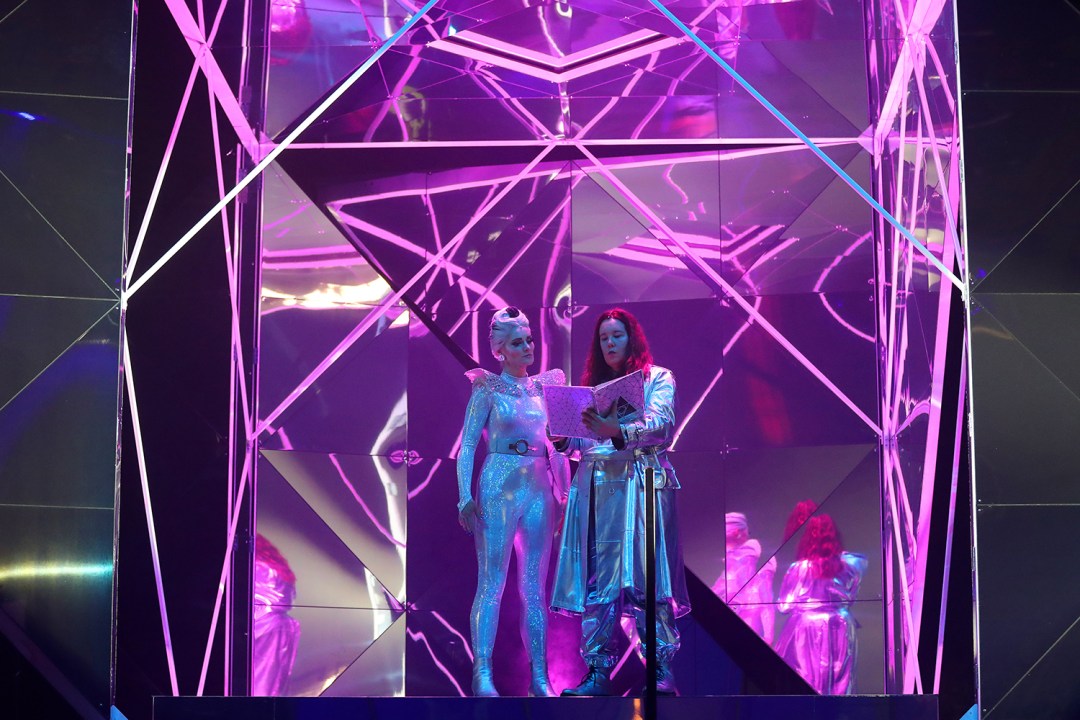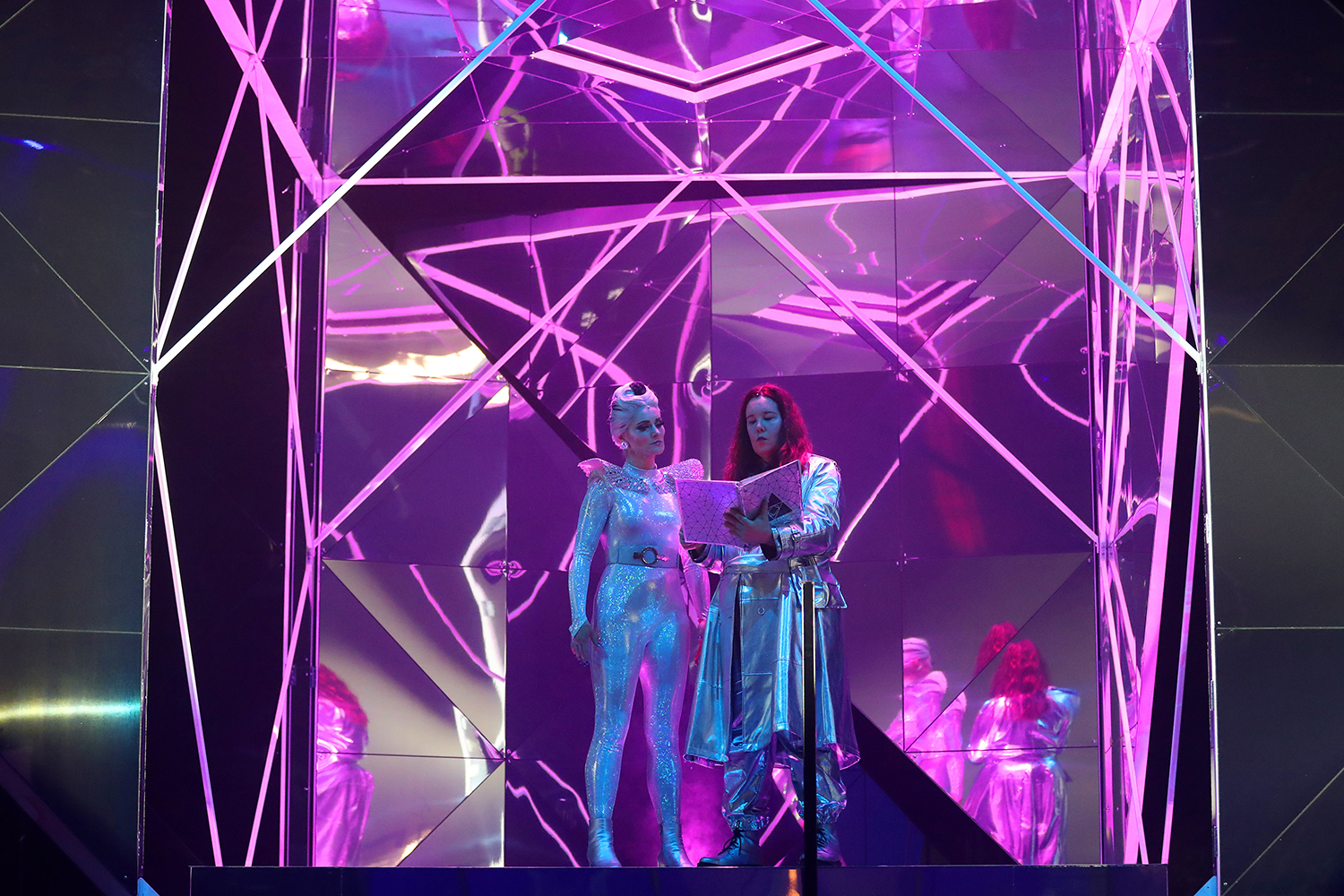This prophecy Merlin shall make, for I live before his time. One of the most thrilling aspects of the Tippett revival has been the discovery that his late masterpieces seem to have been fitted with a four-decade time-fuse. Works that prompted bafflement in the 1970s and 1980s, and then sat there for years looking like duds, are suddenly acquiring their targets. A quarter of a century after Tippett’s death, they’re blinking into life, locking on, and detonating in huge, psychedelic sunbursts of precision-targeted beauty and truth.
Once you treat Tippett’s characters as people rather than symbols, the rest falls into place
In the case of Tippett’s last opera New Year, Merlin (Lucia Lucas) is just one of a trio of otherworldly visitors – travellers in time, and possibly space – who beam down into a contemporary urban dystopia. Or do they? Perhaps they exist only in the imagination of a child psychologist called Jo Ann (Francesca Chiejina), as she despairs of the fractured society around her and struggles to help her delinquent brother Donny. New Year was greeted with a mixture of confusion and disdain when it first appeared in 1989, with the science-fiction elements, in particular, being seen as embarrassing proof that the 84-year old Sir Michael had finally lost it.
Well, that was then: the BBC had just axed Doctor Who and the notion that science-fiction was intrinsically infantile was still being articulated, in all seriousness, by educated people. This is now, and to judge from Birmingham Opera Company’s production – the first in more than three decades – Tippett must have owned a Tardis. Multiculturalism, lockdown, depression among the young and a wider sense of social decay – it’s us, and the jolt of recognition is startling. Tippett’s self-penned libretto references Goethe, William Morris and Close Encounters of the Third Kind. And yet somehow, impossibly, it diagnoses our 21st-century condition and beams it straight back at us, transfigured with music of aching compassion.
This was one of BOC’s promenade productions, staged in a circus tent on the site of Birmingham’s demolished wholesale market. To be honest, though, the sounds alone were enough to have me wandering around the place in a state of something like bliss. Tippett’s score – effectively unheard since 1990 – is a playful summation of his whole career, from the cascading strings of his early works and the choral ecstasies of The Midsummer Marriage to the electric bass and knotty, tender-tough dialectic of his later years. It worked even better in the context of Keith Warner’s grungy staging, as crowds swirled and low brass chords overlapped with the sound of motorbikes on Digbeth High Street.
But there was nothing grungy about the playing – a feat of sustained virtuosity and dramatic focus from the City of Birmingham Symphony Orchestra under Alpesh Chauhan. Warner’s production, meanwhile, was in the tradition of BOC’s late founder Graham Vick. A wise move: it’s hard to imagine a teeming mass of ideas like New Year coalescing in the confines of a conventional opera house (and by all accounts, it didn’t).
So an amateur community chorus immersed the audience in movement and sound, with the inevitable rough edges only fuelling the earthy vitality of the whole. Jo Ann’s terraced house dominated one end of the tent. At the other was the Time Probe, and Nicky Shaw’s designs leaned amusingly into the shonky aesthetic of 1980s BBC sci-fi, with wraparound sunglasses and Bacofoil costumes.
The visitors, it turns out, are not all benign. Their leader Regan is a ringer for Servalan from Blake’s 7 (Tippett was apparently a fan) and Samantha Crawford had wicked fun with her laser-powered coloratura. Sakhiwe Mkosana sang nobly as the streetwise Donny, even finding conviction in Tippett’s awkward attempts (this was 1989, after all) at rap, and Sarah Pring was warm-toned and generous as Nan, his foster mother.
The heart of the show was Chiejina’s Jo Ann – a luminous, intensely touching performance – and her relationship with the time-traveller Pelegrin (Joshua Stewart, a majestic, sunny presence). Stewart’s rapturous melismas as the Time Probe descends, and his subsequent meeting with Chiejina, were extraordinarily lovely. Perhaps Warner’s most important insight into New Year is to realise that once you treat Tippett’s characters as people rather than symbols, the rest pretty much falls into place.
Not quite everything, it’s true. The plot stalls in the second act, and it’s far from obvious what happens to Donny (Warner wasn’t much help there either). The introduction of surtitles to a BOC production feels like a retrograde step when so much about this production style depends upon immediacy. But these are small things compared to the rediscovery of a major opera by a great composer; a prophet without honour whose ambition, complexity and delirious imaginative scope make him (it’s now clear) as formidable a postwar figure as Stockhausen. But funnier. More passionate. And – to his enduring disadvantage – more English.








Comments